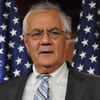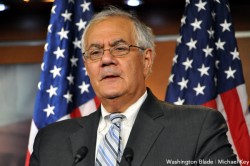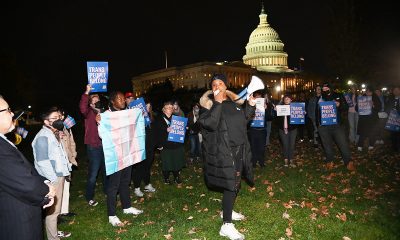National
Frank embraces title of LGBT rights pioneer
Retiring gay lawmaker talks ENDA, 2012 election

Retiring Rep. Barney Frank (D-Mass.) acknowledged on Tuesday his role as a pioneer for LGBT rights during a Washington news conference.
Asked by the Washington Blade whether he thinks characterizations of him following his retirement announcement as a gay rights pioneer are accurate, Frank replied, “Yeah, in the sense that I was the first person to volunteer that I was gay.”
Frank made the comments during a news conference on Capitol Hill following his announcement from the previous day that he won’t pursue a 17th term in the U.S. House. He took questions from Washington-area reporters after participating in a similar event on Monday in his home district in Massachusetts.
MORE IN THE BLADE: PRESIDENT OBAMA PRAISES BARNEY FRANK AS A ‘FIERCE ADVOCATE’ FOR AMERICANS
Frank, 71, was first elected to Congress in 1980 and publicly came out as gay in 1987. The lawmaker was the second openly gay person to serve in Congress. The late Rep. Gerry Studds had come out as gay in 1983, but only after revelations emerged that he had an affair with a 17-year-old male page.
“My colleague Gerry Studds was first person courageously to acknowledge it,” Frank continued. “Before Gerry, a number of members of Congress had been caught in sexual activity that would have led people to infer that they were gay. As I recall, all of them announced that they were too drunk to remember what they were doing, which is an unusual description of one’s capacity to be drunk to remember things, but that’s what they said.”
On his own coming out, Frank continued, “I was the first to acknowledge being gay. … I didn’t do it until I was 47. I was not the daring young man on the flying trapeze here.”
Among those dubbing Frank a “pioneer” for being openly gay as member of Congress decades ago was fellow gay U.S. Rep. Jared Polis (D-Colo.), who Monday in a statement called Frank “a groundbreaking pioneer and one of the most insightful, knowledgeable and humorous people ever to grace the halls of Congress.”
Over the course of the news conference, Frank took questions on matters including the sustainability of the financial reform law known as Dodd-Frank that he helped shepherd through Congress and into law last year and his oversight as House Financial Services Committee chair of subprime mortgage lending that some say contributed to the 2008 financial crisis. However, the lawmaker also took a handful of LGBT-related questions.
Asked why ENDA hasn’t yet become law, Frank said the answer is “very simple” and pro-LGBT bills need Democratic majorities in both chambers of Congress and a Democratic administration to become law.
“The only way you can get any law passed that fights discrimination based on sexual orientation and/or gender identity is if you have a Democratic president, House and Senate,” Frank said. “Now, people don’t realize how rarely we’ve had that. We’ve had a Democratic president, House and Senate for four years out of the 32 I’ve been in Congress. We had it for the first two years under Bill Clinton and we had it for the first two years under Barack Obama.”
Under Clinton, Frank said Americans hadn’t evolved enough in terms of LGBT rights to pass ENDA, although he said LGBT rights were advanced by executive orders enabling LGBT government workers to have security clearances and allowing foreigners to claim asylum in the United States based on their LGBT status.
MORE IN THE BLADE: BARNEY FRANK’S LEGACY
Frank noted that hate crimes protection legislation and “Don’t Ask, Don’t Tell” repeal were able to pass during the 111th Congress. As for why ENDA wasn’t among those bills, Frank said a crowded schedule under which lawmakers worked on health care reform as well as the issue of transgender inclusion were factors.
Frank said the recently passed transgender workplace protections bill in Massachusetts could be a “model” for addressing transgender inclusion issues for ENDA in Congress because of the state law’s more limited scope omitting public accommodations.
“The Massachusetts Legislature just passed and the governor signed a bill that prohibits discrimination on people based on gender identity,” Frank said. “They already had one on sexual orientation. But it’s in employment; it does not include public accommodations. It avoids the whole issue of what happens in locker rooms and bathrooms.”
Frank added he thinks ENDA will become law when the Democrats have control of the White House and both chambers of Congress.
“Given the polarization of this issue and the extent to which the Republican Party has moved to a virtually unanimous overwhelmingly anti-LGBT position — with some exceptions in the Senate on ‘Don’t Ask, Don’t Tell’ — it’ll be the next time you get a Democratic House, Senate and president,” Frank said.
Frank also commented on the importance of having openly LGBT members of Congress, saying, “Personal factors mean a lot.” Frank’s departure could lead to a reduction in the number of openly gay members of Congress, although other candidates are in the running.
“Voting in the abstract on an issue is one thing,” Frank said. “Telling someone with whom you have had good personal relations that you think he’s inferior — that’s harder. … If you believe we should be finishing the fight against … legal discrimination based on sexual orientation and gender [identity], it is important to have people who are gay or transgender or lesbian in the mix.”
As far as issues that weren’t LGBT-specific, Frank also responded to what he thought would happen to Congress after the 2012 election. He said Democrats could win control of both chambers of Congress, but he doesn’t believe Democrats would have sufficient seats for a “workable majority.”
“I don’t think we will have the unusual circumstances we had of having enough senators to almost break a filibuster,” Frank said. “I don’t think in either House you’re going to have workable majorities. I guess that’s the best way to put it. I think it’s very possible that we will have a Democratic majority, but I don’t think you’re going to see a workable congressional majority for the next two years in the House or the Senate.”
Frank also ruled out the possibility of being appointed as secretary of the Department of Housing & Urban Development. Frank had earlier expressed interest in the position in a biography published in 2009. If he had received such an appointment, he would have become the first openly gay Cabinet member.
“My hope that was that Obama would get elected, we would have four years under Obama’s presidency of Democratic control and we could establish some new housing programs,” Frank said. “We would establish some new housing programs and I would like to have the chance to administer them. Unfortunately, it didn’t work out.”
Frank continued that his “biggest disappointment” over his congressional career was that he didn’t advance rental housing programs over which HUD would have jurisdiction as much as would have liked.
“So the reasons that I would have liked to be secretary of HUD would be to administer programs that don’t exist,” Frank said.
Frank also followed up on comments he made Monday saying he “lived a good enough life to be rewarded by Newt Gingrich being the Republican nominee.” The former House speaker is currently the front-runner among the GOP presidential candidates, according to some polls.
The lawmaker said he “isn’t an expert on the Republican nominating process” but believes the rise of Gingrich is the result of dissatisfaction with former Massachusetts Gov. Mitt Romney, whom some consider the establishment candidate for the Republicans.
“I must say, when I saw the Sunday edition of the Union Leader endorse Newt Gingrich, I guess I channeled my grandmother, ‘From Joe McQuaid’s lips to God’s ears,'” Frank said. “It just seemed to me — given the Freddie Mac thing, the marital difficulties, the other issues that he’s got, the fact that he was forced to pay a fine by the House of Representatives — it just seemed to me unlikely. I guess, but, again, I’m not an expert on this, the distaste for Mitt Romney is so strong, it outweighs some of Gingrich’s problems.”
State Department
State Department releases annual human rights report
Antony Blinken reiterates criticism of Uganda’s Anti-Homosexuality Act

Secretary of State Antony Blinken on Monday once again reiterated his criticism of Uganda’s Anti-Homosexuality Act upon release of the State Department’s annual human rights report.
“This year’s report also captures human rights abuses against members of vulnerable communities,” he told reporters. “In Afghanistan, the Taliban have limited work opportunities for women, shuttered institutions found educating girls, and increasing floggings for women and men accused of, quote, ‘immoral behavior,’ end quote. Uganda passed a draconian and discriminatory Anti-Homosexuality Act, threatening LGBTQI+ individuals with life imprisonment, even death, simply for being with the person they loved.”
Ugandan President Yoweri Museveni last May signed the law, which contains a death penalty provision for “aggravated homosexuality.”
The U.S. subsequently imposed visa restrictions on Ugandan officials and removed the country from a program that allows sub-Saharan African countries to trade duty-free with the U.S. The World Bank Group also announced the suspension of new loans to Uganda.
Uganda’s Constitutional Court earlier this month refused to “nullify the Anti-Homosexuality Act in its totality.” More than a dozen Ugandan LGBTQ activists have appealed the ruling.
Clare Byarugaba of Chapter Four Uganda, a Ugandan LGBTQ rights group, on Monday met with National Security Council Chief-of-Staff Curtis Ried. Jay Gilliam, the senior LGBTQI+ coordinator for the U.S. Agency for International Development, in February traveled to Uganda and met with LGBTQ activists who discussed the Anti-Homosexuality Act’s impact.
“LGBTQI+ activists reported police arrested numerous individuals on the basis of their sexual orientation or gender identity and subjected many to forced anal exams, a medically discredited practice with no evidentiary value that was considered a form of cruel, inhuman, and degrading treatment and could amount to torture,” reads the human rights report.
The report, among other things, also notes Ugandan human rights activists “reported numerous instances of state and non-state actor violence and harassment against LGBTQI+ persons and noted authorities did not adequately investigate the cases.”
Report highlights anti-LGBTQ crackdowns in Ghana, Hungary, Russia
Ghanaian lawmakers on Feb. 28 approved the Promotion of Proper Human Sexual Rights and Ghanaian Family Values Bill. The country’s president, Nana Akufo-Addo, has said he will not sign the measure until the Ghanaian Supreme Court rules on whether it is constitutional or not.
The human rights report notes “laws criminalizing consensual same-sex sexual conduct between adults” and “crimes involving violence or threats of violence targeting lesbian, gay, bisexual, transgender, queer or intersex persons” are among the “significant human rights issues” in Ghana.
The report documents Hungarian Prime Minister Viktor Orbán and members of his right-wing Fidesz party’s continued rhetoric against “gender ideology.” It also notes Russia’s ongoing crackdown against LGBTQ people that includes reports of “state actors committed violence against LGBTQI+ individuals based on their sexual orientation or gender identity, particularly in Chechnya.”
The report specifically notes Russian President Vladimir Putin on July 24 signed a law that bans “legal gender recognition, medical interventions aimed at changing the sex of a person, and gender-affirming care.” It also points out Papua New Guinea is among the countries in which consensual same-sex sexual relations remain criminalized.

The Cook Islands and Mauritius in decriminalized homosexuality in 2023.
The report notes the Namibia Supreme Court last May ruled the country must recognize same-sex marriages legally performed outside the country. The report also highlights the Indian Supreme Court’s ruling against marriage equality that it issued last October. (It later announced it would consider an appeal of the decision.)
Congress requires the State Department to release a human rights report each year.
The Biden-Harris administration in 2021 released a memorandum that committed the U.S. to promoting LGBTQ+ and intersex rights abroad.
The full report can be read here.
National
Same-sex couples vulnerable to adverse effects of climate change
Williams Institute report based on Census, federal agencies

A new report by the Williams Institute at the UCLA School of Law finds that same-sex couples are at greater risk of experiencing the adverse effects of climate change compared to different-sex couples.
LGBTQ people in same-sex couple households disproportionately live in coastal areas and cities and areas with poorer infrastructure and less access to resources, making them more vulnerable to climate hazards.
Using U.S. Census data and climate risk assessment data from NASA and the Federal Emergency Management Agency, researchers conducted a geographic analysis to assess the climate risk impacting same-sex couples. NASA’s risk assessment focuses on changes to meteorological patterns, infrastructure and built environment, and the presence of at-risk populations. FEMA’s assessment focuses on changes in the occurrence of severe weather events, accounting for at-risk populations, the availability of services, and access to resources.
Results show counties with a higher proportion of same-sex couples are, on average, at increased risk from environmental, infrastructure, and social vulnerabilities due to climate change.
“Given the disparate impact of climate change on LGBTQ populations, climate change policies, including disaster preparedness, response, and recovery plans, must address the specific needs and vulnerabilities facing LGBTQ people,” said study co-author Ari Shaw, senior fellow and director of international programs at the Williams Institute. “Policies should focus on mitigating discriminatory housing and urban development practices, making shelters safe spaces for LGBT people, and ensuring that relief aid reaches displaced LGBTQ individuals and families.”
“Factors underlying the geographic vulnerability are crucial to understanding why same-sex couples are threatened by climate change and whether the findings in our study apply to the broader LGBTQ population,” said study co-author Lindsay Mahowald, research data analyst at the Williams Institute. “More research is needed to examine how disparities in housing, employment, and health care among LGBT people compound the geographic vulnerabilities to climate change.”
Read the report
Federal Government
Lambda Legal praises Biden-Harris administration’s finalized Title IX regulations
New rules to take effect Aug. 1

The Biden-Harris administration’s revised Title IX policy “protects LGBTQ+ students from discrimination and other abuse,” Lambda Legal said in a statement praising the U.S. Department of Education’s issuance of the final rule on Friday.
Slated to take effect on Aug. 1, the new regulations constitute an expansion of the 1972 Title IX civil rights law, which prohibits sex-based discrimination in education programs that receive federal funding.
Pursuant to the U.S. Supreme Court’s ruling in the landmark 2020 Bostock v. Clayton County case, the department’s revised policy clarifies that discrimination on the basis of sexual orientation and gender identity constitutes sex-based discrimination as defined under the law.
“These regulations make it crystal clear that everyone can access schools that are safe, welcoming and that respect their rights,” Education Secretary Miguel Cardona said during a call with reporters on Thursday.
While the new rule does not provide guidance on whether schools must allow transgender students to play on sports teams corresponding with their gender identity to comply with Title IX, the question is addressed in a separate rule proposed by the agency in April.
The administration’s new policy also reverses some Trump-era Title IX rules governing how schools must respond to reports of sexual harassment and sexual assault, which were widely seen as imbalanced in favor of the accused.
Jennifer Klein, the director of the White House Gender Policy Council, said during Thursday’s call that the department sought to strike a balance with respect to these issues, “reaffirming our longstanding commitment to fundamental fairness.”
“We applaud the Biden administration’s action to rescind the legally unsound, cruel, and dangerous sexual harassment and assault rule of the previous administration,” Lambda Legal Nonbinary and Transgender Rights Project Director Sasha Buchert said in the group’s statement on Friday.
“Today’s rule instead appropriately underscores that Title IX’s civil rights protections clearly cover LGBTQ+ students, as well as survivors and pregnant and parenting students across race and gender identity,” she said. “Schools must be places where students can learn and thrive free of harassment, discrimination, and other abuse.”
-

 District of Columbia5 days ago
District of Columbia5 days agoNew D.C. LGBTQ+ bar Crush set to open April 19
-

 South America3 days ago
South America3 days agoDaniel Zamudio murderer’s parole request denied
-

 Opinions5 days ago
Opinions5 days agoOpen or closed? No, not your bar tab
-

 Maryland4 days ago
Maryland4 days agoMontgomery County police chief discusses arrest of trans student charged with planned school shooting












